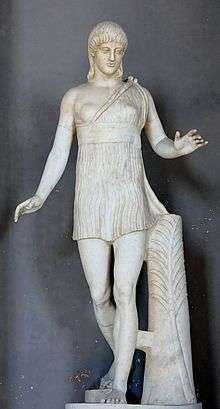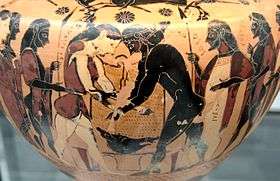Atalanta

Atalanta (/ˌætəˈlæntə/; Greek: Ἀταλάντη Atalantē) is a character in Greek mythology, a virgin huntress, unwilling to marry, and loved by the hero Meleager.
Atalanta was the daughter of Iasus (or Mainalos or Schoeneus, according to Hyginus), a Boeotian (according to Hesiod), or an Arcadian princess (according to the Bibliotheca). The Bibliotheca is the only one who gives an account of Atalanta’s birth and upbringing. King Iasus wanted a son; when Atalanta was born, he left her on a mountaintop to die. Some stories say that a she-bear suckled and cared for Atalanta until hunters found and raised her, and she learned to fight and hunt as a bear would. She was later reunited with her father.
Having grown up in the wilderness, Atalanta became a fierce hunter and was always happy. She took an oath of virginity to the goddess Artemis.[2][3]
Calydonian Boar Hunt
When Artemis was forgotten at a sacrifice by King Oineus, she was angered and sent the Calydonian Boar, a wild boar that ravaged the land, men, and cattle and prevented crops from being sown. Atalanta joined Meleager and many other famous heroes on a hunt for the boar. Many of the men were angry that a woman was joining them, but Meleager, though married, lusted for Atalanta, and so he persuaded them to include her. Several of the men were killed before Atalanta became the first to hit the boar and draw blood. After Meleager finally killed the boar with his spear, he awarded the hide to Atalanta. Meleager’s uncles, Plexippus and Toxeus, were angry and tried to take the skin from her. In revenge, Meleager killed his uncles. Wild with grief, Meleager's mother Althaea threw a charmed log on the fire, which consumed Meleager's life as it burned. Then she died when a new boar came out of the woods and killed her.
Footrace

After the Calydonian boar hunt, Atalanta was rediscovered by her father. He wanted her to be married, but Atalanta, uninterested in marriage, agreed to marry only if her suitors could outrun her in a footrace. Those who lost would be killed. King Schoeneus agreed, and many young men died in the attempt until Hippomenes came along. Hippomenes asked the goddess Aphrodite for help, and she gave him three golden apples in order to slow Atalanta down. The apples were irresistible, so every time Atalanta got ahead of Hippomenes, he rolled an apple ahead of her, and she would run after it. In this way, Hippomenes won the footrace and came to marry Atalanta. Eventually they had a son Parthenopaios, who was one of the Seven against Thebes. Zeus or his mother Rhea turned Atalanta and Hippomenes into lions after they made love together in one of his temples. Other accounts say that Aphrodite changed them into lions because they did not give her proper honor. The belief at the time was that lions could not mate with their own species, only with leopards; thus Atalanta and Hippomenes would never be able to remain with one another.
The Argo
In many versions of the quest for the Golden Fleece, for instance that published by Robert Graves in 1944, Atalanta sailed with the Argonauts as the only woman among them. She jumped aboard the ship soon after the expedition set out, invoking the protection of Artemis, whose virgin priestess she was. She was following Meleager, who had put away his young wife for Atalanta's sake. Atalanta returned his love but was prevented by an oracle from consummating their union, being warned that losing her virginity would prove disastrous for her. In disappointment Meleager joined the Argo, but Atalanta would not let him out of her sight. She plays a major part in various adventures of Jason's crew, suffered injury in a battle at Colchis, and was healed by Medea. Apollonius of Rhodes, on the other hand, claims Jason would not allow a woman on the ship because she would cause strife on the otherwise all-male expedition (Argonautica 1.769–73).
Wrestling

The Bibliotheca also says she wrestled and defeated Peleus at the funeral games for Pelias. The subject is popular in ancient Greek vase painting.
Cultural depictions
- Founded in 1907 in Bergamo by local "liceo classico" (high school) students, football club Atalanta Bergamasca Calcio gets its name from the Greek deity. The club is for this reason also nicknamed "La Dea" (the Goddess) by its supporters.
 The Race between Atalanta and Hippomenes, by Nicolas Colombel (1644-1717), Liechtenstein Museum, Vienna. Atalanta is slowed as she picks up the golden apples rolled down by her rival
The Race between Atalanta and Hippomenes, by Nicolas Colombel (1644-1717), Liechtenstein Museum, Vienna. Atalanta is slowed as she picks up the golden apples rolled down by her rival - The German mythologist, epigramist, composer, physician and counsellor to Rudolf II, Michael Maier published Atalanta Fugiens in 1617, an early work of mixed media which included an epigrammatic verse on the Greek myth, along with 50 emblematic images and music fugues relating to Atalanta's flight.
- Handel wrote a 1736 opera about the character, Atalanta.
- In the 20th century, Robert Ashley also wrote an opera, Atalanta (Acts of God), with loose allegorical connections to the myth.
- Other works based on the myth include a play by Algernon Charles Swinburne, Atalanta in Calydon, written (in the style of Greek tragedy) in 1865.
- Comic books have also used versions of her story, including Hercules: the Thracian Wars, and The Incredible Hulk.
- Versions of the story of Atalanta appear in the television series Atlantis produced by BBC, Hercules: The Legendary Journeys, the Hallmark mini-series of Jason and the Argonauts, and Free to Be... You and Me (featuring the footrace only, no death penalty for the losers, no golden apples, a tie, and a mutual decision that both would explore the world, leaving open the question of marriage).
- Video game appearances include the Golden Sun series, Herc's Adventures, an expansion of Zeus: Master of Olympus, Rise of the Argonauts, and Age of Mythology.
- Atalanta also appears in the 2014 film Hercules, where she is depicted as an Amazonian archer, and member of Hercules' traveling band of mercenaries.
- In the late 1920s, Studebaker adopted Atalanta as a symbolic hood ornament for its cars.[4]
Gallery
 Richard Wilson - Meleager and Atalanta (circa 1770)
Richard Wilson - Meleager and Atalanta (circa 1770) Lëtzebuergesch: Meleager Béierkapp
Lëtzebuergesch: Meleager Béierkapp Landscape with Hunt of Meleager and Atalanta by Jan Wildens (17th century) at Geschonken aan het museum door Artibus Patriae, Antwerpen, 1938.
Landscape with Hunt of Meleager and Atalanta by Jan Wildens (17th century) at Geschonken aan het museum door Artibus Patriae, Antwerpen, 1938.- Meleager and Atalanta by Jacob Jordaens (circa 1618) at the Royal Museum of Fine Arts Antwerp, Belgium
 Meleager presents the Boar's head to Atalanta. From Neueröffneter Musen-Tempel by Bernard Picart, 1733 (University of Heidelberg)
Meleager presents the Boar's head to Atalanta. From Neueröffneter Musen-Tempel by Bernard Picart, 1733 (University of Heidelberg) Atalanta and Meleager by Peter Paul Rubens (ca. 1616) at Metropolitan Museum of Art, New York City
Atalanta and Meleager by Peter Paul Rubens (ca. 1616) at Metropolitan Museum of Art, New York City "Meleager et Atalanta", from a drawing by Giulio Romano, engraved by François Louis Lonsing. Atalanta is the woman on the far left with the bow; Meleager is just right of her, with the boar spear sticking into the Calydonian Boar. (1773)
"Meleager et Atalanta", from a drawing by Giulio Romano, engraved by François Louis Lonsing. Atalanta is the woman on the far left with the bow; Meleager is just right of her, with the boar spear sticking into the Calydonian Boar. (1773) Atalanta and Meleager Hunt the Calydonian Boar by Jan Fyt and Pieter Thijs (1648) at Ringling Museum of Art, Sarasota, Florida
Atalanta and Meleager Hunt the Calydonian Boar by Jan Fyt and Pieter Thijs (1648) at Ringling Museum of Art, Sarasota, Florida- Atalanta and Meleager with the Calydonian Boar by Francesco Mosca, called Il Moschino (ca. 1564-1565). Exhibit in the Nelson-Atkins Museum of Art, Kansas City, Missouri
 Atalanta and Meleager Present the Head of the Caledonian Boar at the Temple of Artemis by M. Maurice Stora (1530 - 1535) at Toledo Museum of Art, Toledo, Ohio
Atalanta and Meleager Present the Head of the Caledonian Boar at the Temple of Artemis by M. Maurice Stora (1530 - 1535) at Toledo Museum of Art, Toledo, Ohio Meleager en Atalanta (between 1675 and 1699) at Rijksmuseum Amsterdam
Meleager en Atalanta (between 1675 and 1699) at Rijksmuseum Amsterdam Meleager and Atalante by Jacob Jordaens (1620-1650) at Museo Nacional del Prado, Madrid, Spain
Meleager and Atalante by Jacob Jordaens (1620-1650) at Museo Nacional del Prado, Madrid, Spain- English: by Circle of Paolo Veronese (f1550-1600) at National Museum of Ancient Art, Lisbon, Portugal
 The Race between Hippomenes and Atalanta by Noël Hallé (1762-1765) at Louvre Museum, Paris
The Race between Hippomenes and Atalanta by Noël Hallé (1762-1765) at Louvre Museum, Paris Atalanta and Hippomenes by Willem van Herp (circa 1650) at National Museum in Warsaw
Atalanta and Hippomenes by Willem van Herp (circa 1650) at National Museum in Warsaw Engraving by Magdalena van de Passe from book Les Metamorphoses d'Ovide, En Latin Et François: Divisées En XV. Livres, page 335. Published 1677.
Engraving by Magdalena van de Passe from book Les Metamorphoses d'Ovide, En Latin Et François: Divisées En XV. Livres, page 335. Published 1677. Atalanta and Hippomenes by Johann Heinrich Schönfeld (1650-1660) at Brukenthal National Museum, Sibiu, Romania
Atalanta and Hippomenes by Johann Heinrich Schönfeld (1650-1660) at Brukenthal National Museum, Sibiu, Romania
Notes
- ↑ In the opinion of Lempriere's Classical Dictionary, "the finest representation of Atalanta"
- ↑ http://www.theoi.com/Heroine/Atalanta.html
- ↑ http://thanasis.com/store/atalanta.htm
- ↑ The Golden Age at Studebaker 100 historical website
Sources
- Apollodorus, Bibliotheca 3. 9. 2 for Atalanta and 1.8.3 for the Boar Hunt
External links
| Wikimedia Commons has media related to Atalanta. |
_Meleager_and_Atalante.jpg)